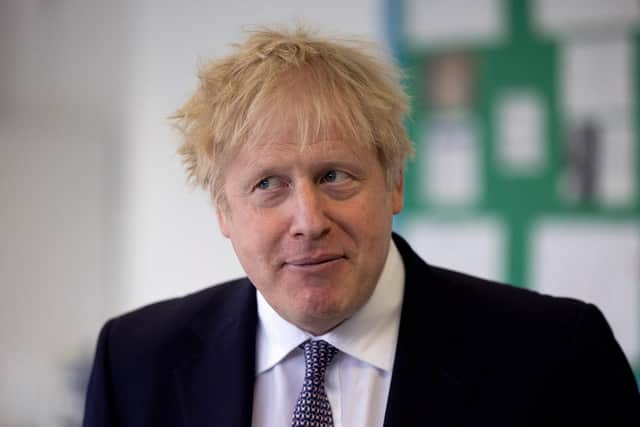Scottish election 2021: Boris Johnson's Brexiteer government is giving Scotland some serious reasons to choose independence – Joyce McMillan
In London, for example, Boris Johnson’s government continues to pile up the reasons to vote heavily for independence almost as if they actually wished Scotland to be gone, taking all its resources with it.
In a bizarre twist of fate, the scandal that has finally stripped off Johnson’s Teflon veneer, for at least a section of the London-based media, is not the £37 billion spent on a failed track-and-trace system, nor yet the government’s shameless contracts-for-mates pandemic procurement system, but the relatively petty matter of the £58,000, from an as yet unknown source, that he and his fiancee Carrie Symonds apparently spent on the redecoration of the Prime Ministerial flat in Downing Street.
Advertisement
Hide AdAdvertisement
Hide AdYet with former aide Dominic Cummings now apparently out to get his ex-employer on matters both grave and trivial, this is the stuff that has caught the eye of journalists within the Westminster bubble; and so it is that Scotland moves towards what could be a vital election for its future, with a large slice of the media that surrounds us babbling incessantly about Boris Johnson’s curtains and carpets, and about which of his dodgy billionaire acquaintances might have offered to pay for them.
Beyond the current row, there is of course a myriad of much graver reasons why Scotland might well feel that it should quit the sinking ship UK, and quit it now.
To give just two glaring examples, the Johnson government’s lethal mixture of ignorance, incompetence and dishonesty in dealing with the impact of Brexit on Northern Ireland this week led to the resignation of Arlene Foster, the DUP leader who – while doggedly right-wing on social and constitutional issues by any normal standards – finally proved not quite right wing enough for a majority of her own supporters, and to her likely replacement by a representative of that wing of her party whose attitudes can only drag the province back towards the darkest days of conflict, before even the Rev Ian Paisley began to see the peace-making light.
The most serious issue of all, though, in terms of lives lost, remains the Johnson government’s mishandling of the pandemic, a subject now also present in the UK media after the leaking of a quote – apparently also from the Dominic Cummings camp – about how Johnson allegedly said, last autumn, that he would rather see “piles of bodies” of Covid victims in the UK than shut down the economy for a second time.


For reasons difficult to disentangle, including a desire to maintain morale, consumers of mainstream media in the UK have been somewhat protected from a full appreciation of just how severe Britain’s Covid epidemic has been.
At almost 1,900 lives lost per million of population, though, our death toll remains among the worst in the world; and evidence is accumulating that much of the appalling scale of that toll was down to Boris Johnson’s lack of courage in taking early decisions to shut down economic activity and impose effective border controls, and to his prolonged flirtation with the false argument that there is a trade-off between controlling Covid and saving the economy, when in fact controlling Covid remains the only key to minimising economic damage.
If there is a political price to be paid, though, for this catalogue of disasters, it is clear that even after this week’s wallpaper crisis, Boris Johnson is not really paying it yet. Across the Atlantic, the United States celebrates not only 100 days of Biden government, but also the success of its 270-year-old constitutional system in delivering the nation from the age of Trump, and setting it back on the path towards much greater competence, integrity and vision in government.
Here in Britain, though, we are still caught in the political doldrums of Brexit, with no hope of consensus on how to “build back better” after the pandemic, and no prospect of a Westminster government committed to the kind of reform that would create a new union on these islands fit for the 21st century.
Advertisement
Hide AdAdvertisement
Hide AdThe people of Scotland are not only critics of that failing Westminster process, observing it from some distance, but also part of it, daily distracted and bamboozled by a UK public conversation that admits no real possibility of radical change, and genuinely believes that ten-years-on coverage of Kate Middleton’s wedding dress is of more interest to people in Britain than the exposure of real corruption and lethal incompetence in high places.
And the question we face this week, as we prepare to vote, is therefore both straightforward and boundlessly complex: the question of whether we can somehow wade our way through this pea-soup of confusion – through our own post-Covid exhaustion and that of the First Minister, through the deliberate disruption by Alex Salmond and Alba of the carefully nurtured image of SNP competence and unity that was beginning to attract undecided voters, through the ever-present threat of climate breakdown, and the abiding British instinct to “cling to nurse” even when that nurse looks increasingly like a badly rehearsed pantomime Dame – towards some clear decisions about our own possible future, either as a broadly compliant region of post-Brexit Britain, or, after what would doubtless be a tough transition, as part of a growing band of successful smaller nations, here on the northern edge of Europe.
A message from the Editor:
Thank you for reading this article. We're more reliant on your support than ever as the shift in consumer habits brought about by coronavirus impacts our advertisers.
If you haven't already, please consider supporting our trusted, fact-checked journalism by taking out a digital subscription.
Comments
Want to join the conversation? Please or to comment on this article.
